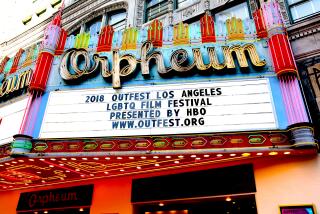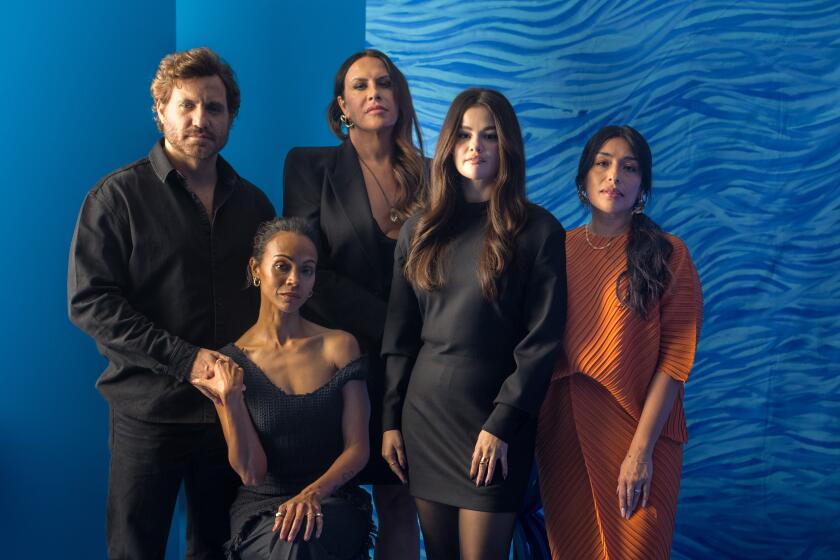On the hunt for another ‘Moonlight,’ Outfest celebrates 35 years
When “Moonlight” won the best picture Oscar just four months ago, many suggested change might be on the horizon. Finally, queer storytelling had taken center stage and stories of and about LGBTQ people, even those of color, would have a fighting chance at mainstream success.
But Christopher Racster, executive director of Outfest — Los Angeles’ leading LGBTQ film festival celebrating its 35th anniversary Thursday through July 16 — knows better. “The realities of the corporate entertainment industry,” he said, say otherwise.
“‘Moonlight’ was a success, but the corporate entertainment industry doesn’t feel necessarily that they then should jump into more queer storytelling. They’ll look at it as a one-off,” he said, noting that when queer films do get made and are not commercial (or critical) successes, it jeopardizes the next one.
“They’ve done a lot of straight films and many of them haven’t done well...,” Racster continued. “There’s this economic imperative that I think still blocks a great volume of queer films from being made.”
That’s where LGBTQ film festivals come in: Where traditional Hollywood turns its head, Outfest is there. And just because a gay film can rise to garner the industry’s most coveted golden statue, and commercial success, it doesn’t mean a festival specifically for such films is no longer relevant.
The solution comes with having a diverse range of representations. That doesn’t mean just ‘Moonlight.’ It means many ‘Moonlights.’
— Andrew Ahn, director
Founded by UCLA students in 1982, Outfest has grown to 11 days of film (and TV) screenings, panel discussions and other happenings throughout the city. This year’s event is packed with 194 films from 30 different countries with some of the featured movies including Francis Lee’s “God’s Own Country” as the festival opener (Thursday at 8 p.m. at the Orpheum) and Trudie Styler’s directorial debut “Freak Show” as the closer (July 16 at 7 p.m. at the Theatre at Ace Hotel).
Special centerpiece screenings include the docs “Kevyn Aucoin: Beauty & the Beast in Me” from director Lori Kaye and “Behind the Curtain: Todrick Hall” from Katherine Fairfax Wright.
Other notable screenings include Damon Cardasis’ “Saturday Church” about a young teen discovering church in the West Village where vogueing is more important than sermons; Maysaloun Hamoud’s “Bar Bahar (In Between)” about a trio of Palestinian women who share an apartment in Tel Aviv; and Sabaah Foloyan and Damon Davis’ “Whose Streets?,” a documentary made in the immediate aftermath of the killing of Michael Brown in Ferguson, Mo., that helped galvanize the #BlackLivesMatter movement.
As the world waits to see how “Moonlight’s” win will affect what films get made in the near future, an obvious sign some might say of the LGBTQ community’s rise in acceptance, Racster reiterates that queer storytelling and Outfest are about more than just being seen. It’s about community.

“Some people might think that this is just about queer visibility and once you’re seen everywhere, there’s no need for the festival,” he said. “But this is a community experience. This is one of the few opportunities for people to come together and see ourselves as a group and really feel affirmed.”
Andrea James, an Outfest alumna who showed her first short, about casting transgender actors titled “Casting Pearls,” in 2007, agreed. It’s why she eventually joined the festival’s board.
“There is a community of filmmakers and then there are communities within that community,” she said. “It’s important for us to go into a screening full of LGBTQ people watching LGBTQ stories. It’s important for us culturally because that community-building is so critical … considering our current political discussion.”
“Even with ‘Moonlight,’ there’s always room for more storytelling,” she added.
In reflecting on his relationship with Outfest and its importance 35 years after inception, Andrew Ahn, whose debut feature “Spa Night” won the festival’s grand jury prize last year, credited the festival for his career. His previous two short films also screened there.
In many ways, Outfest gave me my career … and really helped me find a community.”
— Andrew Ahn
“In many ways, Outfest gave me my career … and really helped me find a community,” he said. “It’s a place for me to connect with other like-minded queer artists. It’s really inspiring and keeps me going.”
To those who question the need for LGBTQ film festivals in the wake of “Moonlight,” he offered this:
“When I came out to my parents, my mom asked if me being gay was going to hurt my film career. Outfest showed me that I could make really gay films and have an audience for it. It proved that I could tell personal stories, stories about my identities, and that there was a value to it and it was something people would pay for and go watch.”
And though “as a LGBTQ POC filmmaker” he was “so excited” to see Barry Jenkins’ film win the Oscar, he cautions, “I don’t think that it’s the end of our problems in representation in the media.”
“The solution comes with having a diverse range of representations. That doesn’t mean just ‘Moonlight.’ It means many ‘Moonlights.’”
Perhaps something at Outfest this year will fit the bill.
What: Outfest Los Angeles
Where: Directors Guild of America, 7920 Sunset Blvd.; Harmony Gold Theatre, 7655 W. Sunset Blvd.; Ford Theatres, 2580 Cahuenga Blvd.; REDCAT, 631 W. 2nd St.; Theatre at Ace Hotel, 842 South Broadway
When: Thursday through July 16
Tickets: $15 general admission; select screenings more
More info: (213) 480-7065, www.outfest.org
Get your life! Follow me on Twitter (@TrevellAnderson) or email me: [email protected].
More to Read
Only good movies
Get the Indie Focus newsletter, Mark Olsen's weekly guide to the world of cinema.
You may occasionally receive promotional content from the Los Angeles Times.











